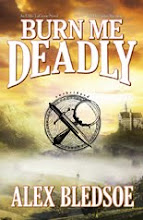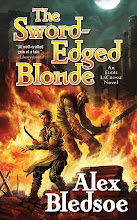
There haven't been very many good novels about popular music. It could be due to the inherent contradictory nature of writing in concrete terms about something so ephemeral, even when the writers are also musicians. Music is such an individual experience that it can be daunting to find the absolutes in it. I know, because I've tried: my novel
The Hum and the Shiver, coming from Tor in 2011, is about music, among other things.
(An example of how to do it badly is Mark Childress' 1990 novel,
Tender. He takes the life of Elvis, changes all the names [i.e, Leroy Kirby] and pretends it's a novel. There are no insights, just a xerox of a famous life transcribed as fiction. His descriptions of rock and roll are as banal as Dick Clark's
American Bandstand introductions. For the best Elvis novel I've read, try
Stark Raving Elvis by William McCranor Henderson.)
P.F. Kluge got it right in his 1980 novel
Eddie and the Cruisers. Yes, it's the source for the 1983 film, but forget that for a moment. What Kluge does is something harder, and deeper, than the film's mere missing-album mystery. Kluge shows us the limits of the music, and how real talent sees it and pushes past it. He demonstrates where
Leaves of Grass and "Hound Dog" coincide.
Frank Ridgeway is a high school teacher blindsided by his past: a song he wrote twenty years earlier, for his band Eddie Wilson and the Parkway Cruisers, suddenly becomes popular again. People come out of the woodwork seeking information on the band, its mysterious leader Eddie, and the secret tapes he made deep in the woods with unknown musicians just before his death. Frank reconnects with his old bandmates and pieces together the mystery, all the while being trailed by someone willing to kill for those tapes.
***SPOILER ALERT***
In the movie the missing tapes are the first concept album, predating the Beatles'
Sgt. Pepper. In Kluge's novel, it's much more complex. Eddie and the band play an Apollo-ish theater, and while they don't bomb, they also don't really connect with the black audience. This drives Eddie to find a way to cross that color line, which he does by summoning all the biggest stars of the time (by implication Elvis, Chuck Berry, Buddy Holly, Otis Redding and so forth) to a quonset hit deep in the Jersey woods. Each is known only as "Mr. White" or "Mr. Black," and they make music as anonymous equals, with no thought of race. Then Eddie dies, and the tapes vanish.
There are two main stylistic differences between the movie and the book. First, the book plays for real stakes, life and death. People die for these tapes, and Frank's life is in genuine danger. The second is the true affection for rock and roll, for how it makes the people who hear it and play it
feel. Consider this moment, in which Eddie's elderly mother talks about her son:
"So many nights, he'd sit up in the dark, listening to that radio. His father said he was like a spy, receiving secret messages." (p. 121 in the hardcover edition)
Or this, when the nearly-forty Frank Ridgeway describes digging out his old record collection:
"Those cheap little discs, scratched and dirty, with my initials on the label, sitting in the attic...they were alive!" (p. 126)
Or this, Ridgeway describing a particular Cruiser performance:
"We played for two hours, no breaks, no patter, no tuning or stalling, Eddie rushing from one song to another, and the way he pounced on the songs, the way he explored, prolonged, teased, reprised, exhausted them, you had to think--and I later confirmed this with some other people--that he was fucking the songs." (p. 150)
Or this, Eddie's former girl Joanne at the prospect that he isn't dead after all:
Every time she said his name, it came a little easier. Eddie, Eddie, Eddie, like a refrain in a song. My boyfriend's back and there's gonna be trouble. Hey, bird dog, get away from my quail. You really got a hold on me. Some hold it was. (p. 216)
There are lots of other examples, because Kluge gets one thing exactly right: music, real music,
matters. It's the context for our emotions, for feelings that can't be expressed any other way. That's as true for the audience as the performers.
I enjoy the movie version of
Eddie and the Cruisers, particularly its soundtrack, but the book is a whole other level of accomplishment. If you love rock and roll, if you understand why Elvis was the King, Springsteen is the Boss, Dylan is the Jester and know the smell of teen spirit, then you'll love this book. It's available
here.So what music novels get it right for you?
























